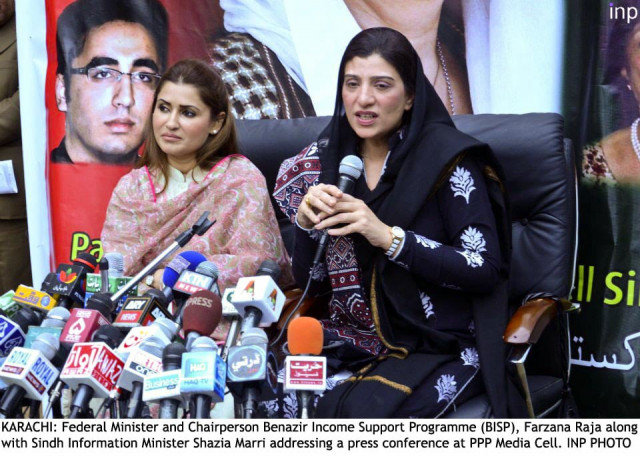Raja dwells on BISP achievements, questions Shah Mehmood’s stance
The welfare programme will not be binned after this government, she says.

Farzana Raja, the chairperson of the Benazir Income Support Programme (BISP), drew on her experience of working with Qureshi when she was information secretary and he was the president of the PPP in the Punjab.
“I understand his nature well and am crossing my fingers to see how he can work with Imran Khan,” Raja said with a decisive air. She was speaking to reporters at a press conference at the PPP’s media cell on Tuesday and was accompanied by Sindh Information Minister Shazia Marri.
Raja noted that Qureshi has changed his stance from 2009 - when he said Pakistan’s nuclear weapons were safe - to now, when he claims they are not. She pondered aloud whether he was doing this at the behest of “countries that are our enemies”. “I do not want to waste my time by mentioning his name again and again. I am also appealing to PPP workers and jiyalas to not take any emotionally driven steps.” She spoke extensively about BISP’s achievements. According to Raja, BISP is supporting six million families in Pakistan, including 2.4 million in Sindh and 1.9 million in Punjab.
When asked if these numbers either showed favouritism for Sindh or the lack of support from Punjab, Raja said that the state of poverty in Sindh was far more acute than in Punjab as a whole, which was better off financially. “Northern Punjab is not as poor as southern Punjab, for example. My own constituency is in north Punjab - Rawalpindi - and there are very few beneficiaries from there, so I haven’t even been able to show favouritism in my own area!”
Additionally, Raja pointed to the impact of the 2010 floods in Sindh and Punjab that had impoverished families in the provinces.
After surveying the provinces, Raja said that the BISP was also conducting surveys in the Federally Administered Tribal Areas and identifying beneficiaries, noting that while many either talk for or against the ‘war on terror’, the PPP is practically working in the areas that have been impacted.
“The fact that the BISP has been appreciated by foreign donors and countries is proof of its transparency,” she said.
Raja believes that the programme will not go the way of many others, which are binned when another political party takes charge or abandoned for others. “Like development programmes worldwide, we have done five-, 10-, 15- and 20-year plans,” she said. “We are building an institution. When the bill [for the BISP] was passed in the National Assembly and the Senate, no political party opposed it or had any objections.”
Published in The Express Tribune, November 30th, 2011.


















COMMENTS
Comments are moderated and generally will be posted if they are on-topic and not abusive.
For more information, please see our Comments FAQ